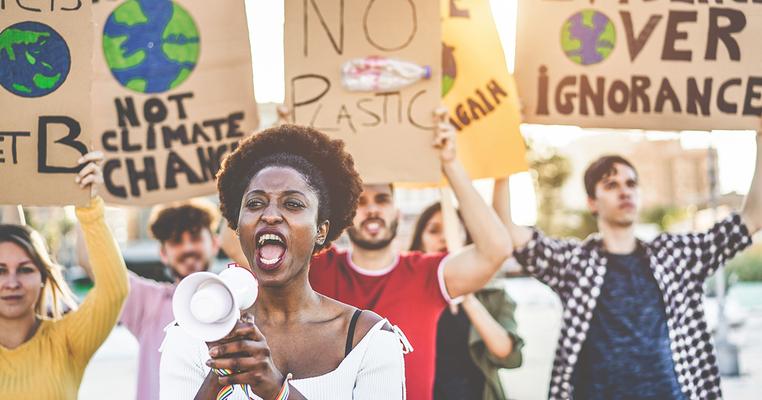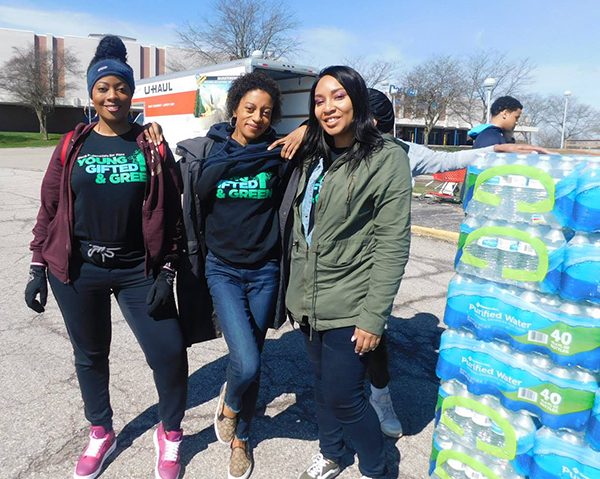
Building Community Resilience: The Path Toward Environmental Justice
For generations, systemic racism has put communities of color in the path of pollution. Today, the climate crisis is exacerbating impacts for these frontline communities, through extreme weather, sea level rise, heat-related illness, and much more.
The term “resilience” literally refers to the capacity to recover – to bounce back – from difficulties. Frontline and fenceline communities have had to be resilient, dealing with health and financial challenges that cascade and impact entire families and regions.
Yet, as long as structural inequities remain, the source of these problems won’t be addressed.
Community organizers increasingly are focusing on empowering residents with knowledge and advocacy tools related to the climate crisis in order to build community resilience and forge a just transition to clean energy.
Today, we look at three organizations building the leadership required to truly change the course of their communities. The Climate Reality Project is proud to partner with these groups in this work by designating them recipients of our 2021 Climate Justice for All Grants.
Uplift
Since 2015, Uplift has been organizing in the Southwest, where the climate crisis has manifested in long-term drought and increasing incidence and intensity of wildfires. “Our region is an energy sacrifice zone,” the organization states. “Over 100,000 sites of extractive infrastructure exist on the Colorado Plateau, including oil and gas wells, and uranium and coal mines.”
This summer, the group is running a digital fellowship for the second time in order to engage frontline BIPOC youth from Colorado, Utah, Arizona, and New Mexico to become problem solvers and advocate for a just future. The program aims to produce a more inter-connected, resourced, and empowered new generation of climate activists in the greater Southwest.

Uplift understands the power and importance of youth when it comes to community resilience: Its core organizers and leadership team are young people, most of whom are Indigenous and immigrant-descended young women.
“Young people are uniquely poised to advocate for a climate just future as we are adept at imagining and experimenting, two skills necessary for creating a world that is no longer dependent on extractive industries,” states the organization. Sure enough, past fellows have gone on to support and lead campaigns within their communities, including supporting community gardens, leading campaigns to stop oil extraction, developing outings with Latinx youth, and organizing efforts to protect Bears Ears, a site sacred to many Southwest tribes.
The Gullah Geechee Chamber Foundation
Coastal South Carolina sits squarely in the path of climate catastrophe, experiencing sea level rise and severe storms including tropical cyclones that have hit regularly for the past several years. According to The Gullah Geechee Chamber Foundation, those weather impacts threaten valuable ecosystem services provided by natural resources, which historically have allowed for quality agriculture, flood mitigation, air and water quality enhancement, access to fishing and raw materials for traditional crafting practices, and an overall good quality of life.
Today, climate change puts all this at risk. The Foundation aims to engage local people and communities on the front lines of the climate crisis who have been disenfranchised and under-resourced in dealing with these impacts.
“The main goal of this project is to enhance climate change awareness and environmental literacy amongst BIPOC and frontline communities in coastal South Carolina so that they are prepared to have a voice at the table to ensure that socially optimal and sustainable adaptation solutions are implemented in their communities,” states the organization.
To do so, the group is creating a program focused on building resilience with education in the form of conference sessions and speakers, focusing on the latest science and case studies in climate resilience.
Black Millennials 4 Flint
Black Millennials 4 Flint (#BM4F) is a grassroots environmental justice and civil rights organization created to take action against the crisis of lead exposure in Black and Latino communities. This summer, the group will conduct an intensive training focused on federal policy as it relates to health equity and environmental justice in Flint, Michigan.

“Flint is most known for the water crisis; however, Flint has been a frontline EJ community for decades due to legacy pollution from the automobile industry and increased challenges with extreme weather due to climate change,” the organization states. According to the group, in the 1990s, an incinerator near Flint used wood from demolished lead-contaminated buildings to generate electricity, exposing nearby air and soil to dangerous levels of toxins. “The intersection of body burden, white flight and racism … continues to cause instability in Flint’s social determinants of health,” it states.
In response, the group has created The EJ Griot Project. “Griots” is a term originating in Mali, where it refers to storytellers who maintain their tribal community’s narrative through oral traditions.
BM4F is using the concept to develop the capacity of young BIPOC leaders to become ambassadors through political advocacy, activism, and community organizing. Ultimately, the aim is that this cohort can imagine, articulate, and then help to enact a new narrative that can champion environmental justice and lead to improved health in the community.
The application for our 2022 Climate Justice for All grants program is now open. If you’re part of an environmental justice organization working with frontline communities in the US, maybe we can help. Our Climate Justice for All program offers up to $20,000 in support, together with professional input and assistance from our team at Climate Reality. The grant period runs from May to December of this year.
Learn more and apply by March 7, 2022, at http://www.climaterealityproject.org/apply/grant.

